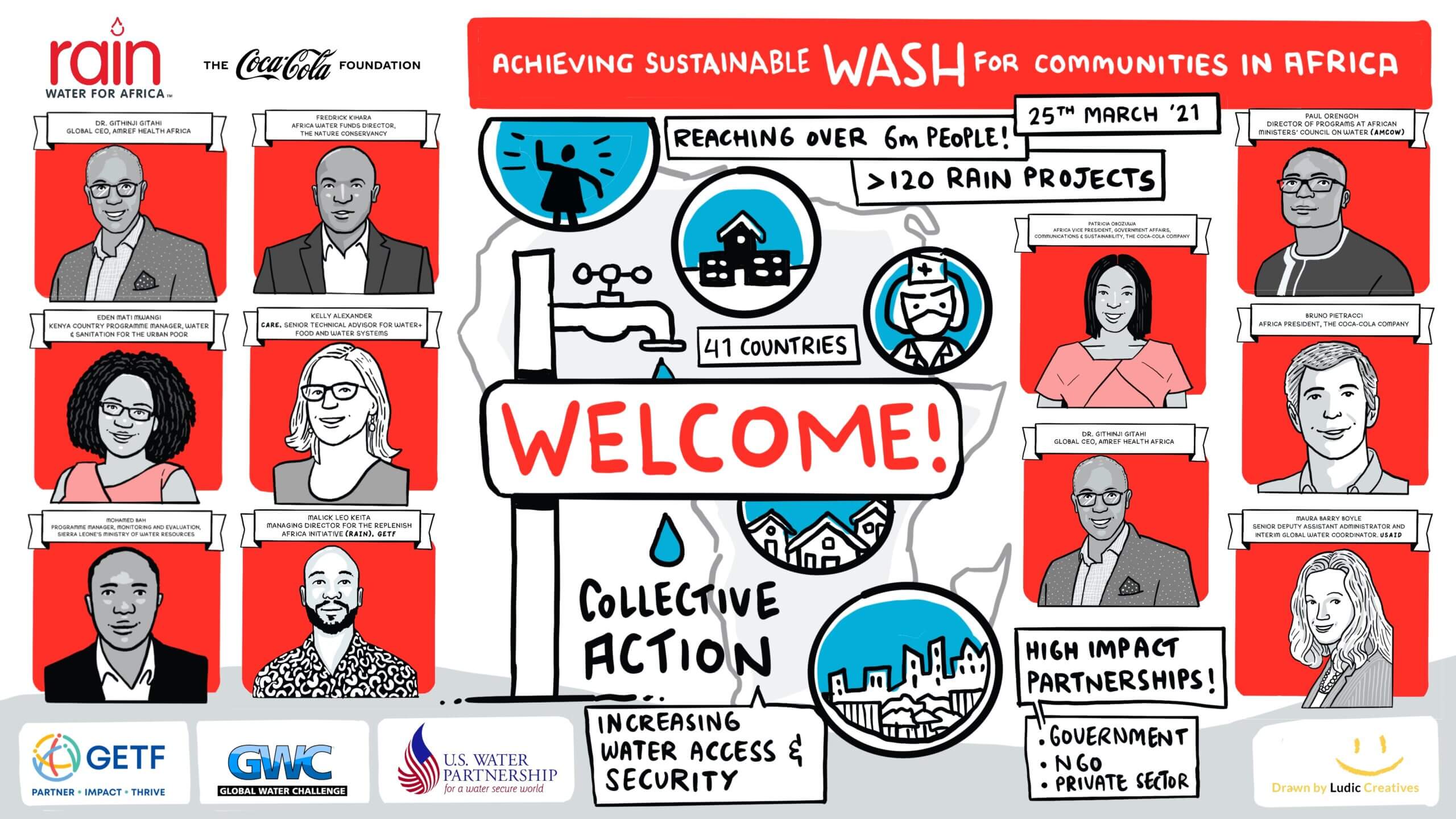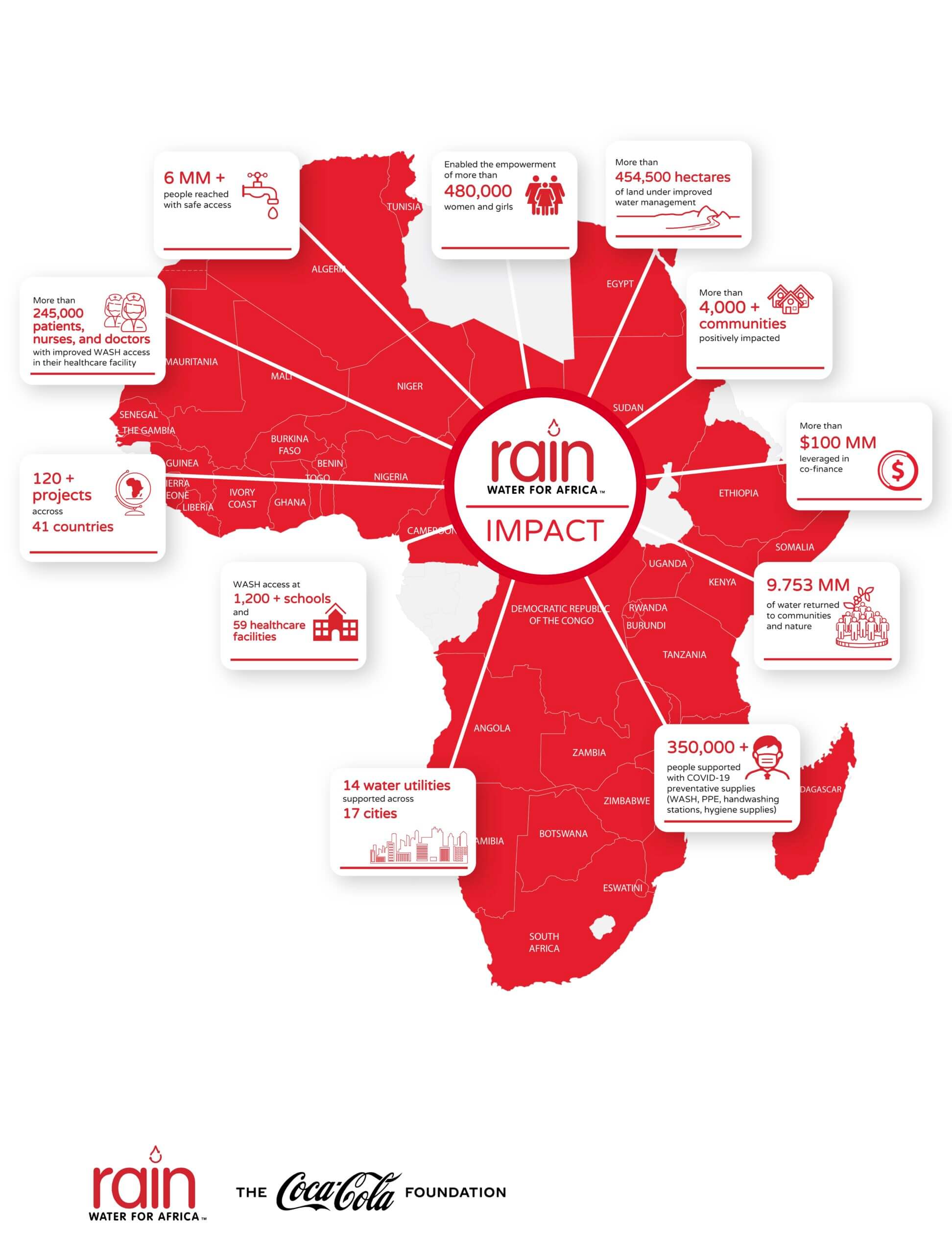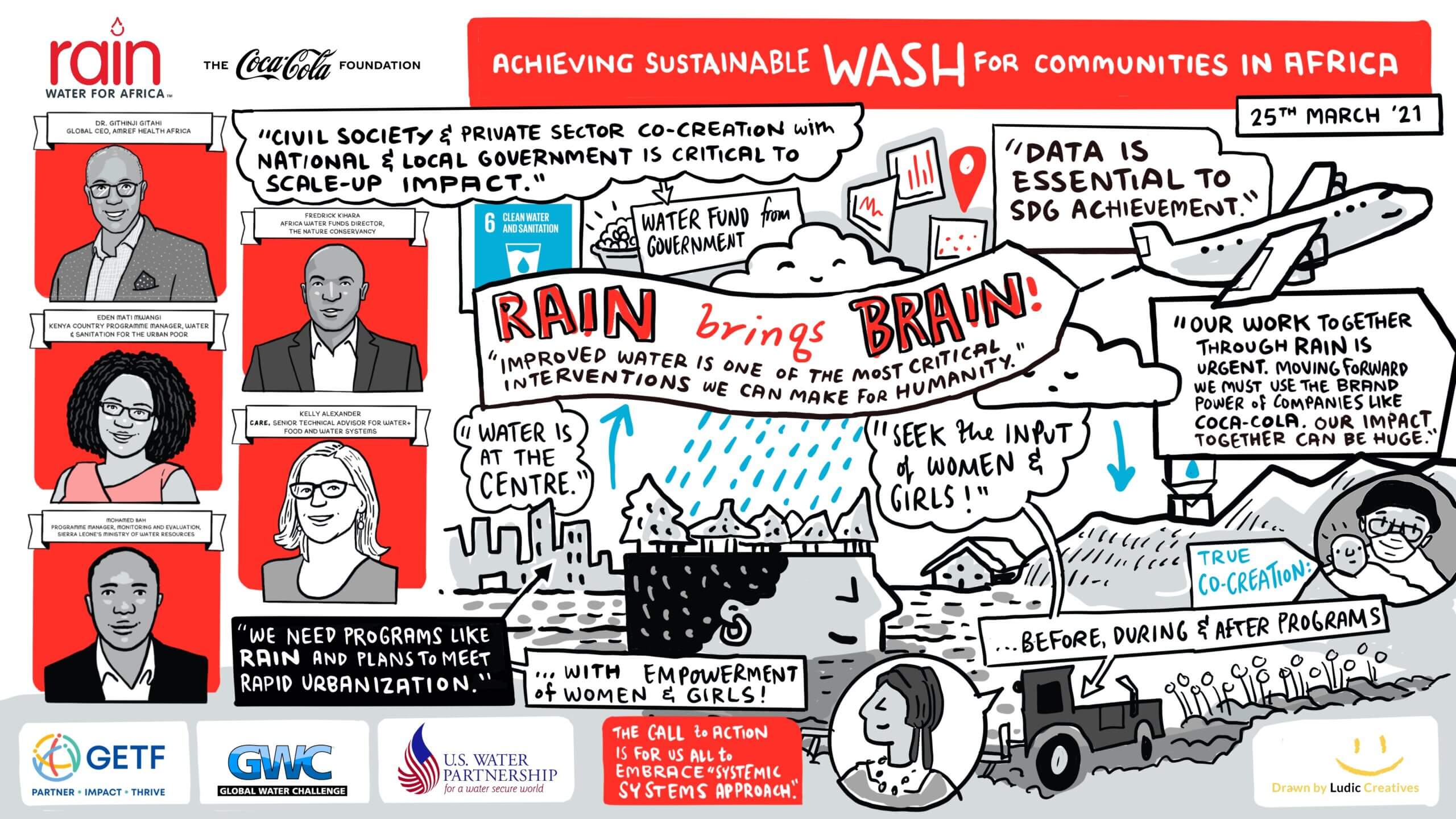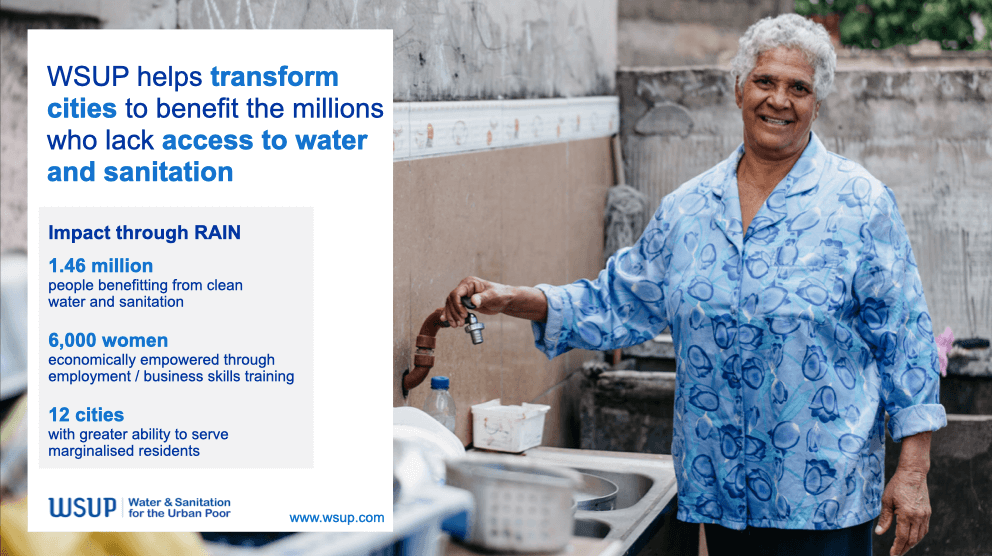Experts agree achieving safe, sustainable and accessible water for all in Africa requires immediate collective action and resource commitment – as evidenced by RAIN, the largest pan-African clean water program.

A full recording of the event can be watched here. At a virtual Roundtable on March 25th to mark World Water Day 2021, RAIN partners and sector leaders discussed insights from the RAIN platform and priorities to mobilize collective resources for further impact. On the same day, The Coca-Cola Foundation announced that RAIN has positively impacted six million people in over 4,000 communities across 41 countries.
The event, hosted by the Global Environment & Technology Foundation (GETF), Global Water Challenge (GWC) and the U.S. Water Partnership (USWP) convened leaders from The Coca-Cola Company and Foundation, the U.S. Agency for International Development (USAID), the African Minister’s Council on Water (AMCOW), and representatives from RAIN’s leading civil society partners.
Opening remarks by Dr. Paul Orengoh, AMCOW’s Director of Programs, highlighted sector trends and emerging challenges threatening SDG 6 progress, including climate change, urbanization, sanitation, reliable data, and integrated water resources management. Dr. Orengoh called on the group to forge more strategic partnerships to address WASH in the face of these challenges. “As an institution that subscribes to the principle of collective action, the African Ministers’ Council on Water (AMCOW) firmly encourages strategic partnerships and coalitions, to include public-private sector engagement, private-private collaboration, multi-stakeholder efforts around sustainability priorities among others, which are all essential to achieving universal access to water, sanitation and hygiene, and meeting the 2030 agenda for Sustainable Development Goals,” said Orengoh.

Mr. Bruno Pietracci, President of The Coca-Cola Company in Africa then shared RAIN’s multiple socio-economic achievements stating that in addition to improving clean water access for millions of people, RAIN has empowered over 400,000 women and youth; enhanced quality education by providing schools with improved WASH; delivered critical supplies and sanitation to slow the spread of COVID-19 and supported 14 water utilities across 17 cities.
Mr. Pietracci reaffirmed Coca-Cola’s commitment to expand sustainable WASH in Africa. “With WASH access, climate adaptation and crisis recovery at the core of The Coca-Cola Company’s 2030 Global Community Water Strategy, we will endeavor to scale RAIN’s impact to improve water security for millions more on the continent, building upon the learnings and recommendations developed by the platform’s success […]. But it’s also the time to be humble. We cannot do this alone, Africa’s water security challenges are quite significant and quite complex, and we invite other companies, national governments, and civil society to work not only to scale up the impact of RAIN but also to create innovations and other best practices across the continent,” said Pietracci.
Ms. Maura Barry Boyle, USAID’s Senior Deputy Assistant Administrator and Interim Global Water Coordinator, provided public sector perspectives on the vital role that collective action plays in addressing Africa’s water challenges, underlining the importance of WASH amidst the COVID-19 pandemic.
“Beating the pandemic and addressing the climate crisis are top priorities of the new Biden-Harris administration both here domestically in the US and abroad […]. We know that access to water, sanitation, and hygiene services […] remains essential to the long road that we have for economic recovery; and that said, access to WASH is extremely critical at this very moment,” she said.
Ms. Boyle highlighted USAID’s partnership with Coca-Cola through the Water and Development Alliance (WADA), which has made significant contributions towards RAIN’s goals, as an impactful model to pool public and private resources to address water challenges. “The private sector is a powerful catalyst and innovator for change. For more than 15 years, The Coca-Cola Company, Foundation, and Bottlers have been steadfast partners of USAID in addressing water stewardship and access across the African continent and beyond. The recipe behind this enduring partnership is that it’s based on shared values and commitment and together, we’re able to convene more stakeholders to the table than we would be able to do on our own,” said Ms. Barry Boyle.
KEY TAKEAWAYS
Panelists and speakers then discussed priorities for scaling-up access to affordable and sustainable WASH solutions to meet Sustainable Development Goal (SDG) 6:
Support mandated service providers and co-create WASH service delivery solutions with governments.
Water and Sanitation for the Urban Poor (WSUP) and Amref Health Africa agreed on the criticality of increasing government commitment as fundamental to sustainable community service provision.
Ms. Eden Mati, WSUP’s Kenya Country Program Manager, highlighted challenges that urban water utilities face, including meeting the needs of existing large populations, while planning and gaining investment for future population growth – calling for collective action to support mandated services providers. “Within urban areas, [we need] to pool resources together at a citywide level and work together to address the barriers that are restricting access across cities,” said Mati.

Amref’s CEO, Dr. Githinji Gitahi, lauded the RAIN partnership saying that “RAIN brings BRAIN because children who are well-fed and well-nourished and [have] good hygiene and have water when they are young, actually develop good brain capacity, cognitive capacity that allows them to go to school and have quality education. About working with governments, Dr. Gitahi said that AMREF’s role is “to co-create, co-develop and co-invest in innovative, sustainable, financially-inclusive WASH solutions”.
Increase data collection and usage to improve service delivery, monitoring, and decision making.
Sierra Leone’s Ministry of Water Resources advocated for an increased water sector focus on data, an effort they have been prioritizing for the past five years with RAIN and Global Water Challenge (GWC) as key partners. By increasing WASH monitoring and evaluation, the Ministry now boasts the region’s most comprehensive WASH data approach. Mr. Mohamed Bah, Head of Monitoring and Evaluation for the Ministry, presented the partnership with RAIN and GWC which has helped to advance WASH data analytics to inform decision making. “Now with correct data, we can accurately determine where we will get best value for money by building the next water point and provide information on WASH technology performance,” said Mr. Bah. He advocated that this effort be replicated in other African countries.
Continue to address the gender gap by focusing on the WASH needs of women – leveraging private and public expertise and resources.
Ms. Kelly Alexander, CARE’s Senior Technical Advisor on Food and Water Systems, called on the group to continue leveraging the public and private sectors to advance gender equality. “Women want training and skills! Marketing, financial literacy, budgeting, planning – the private sector can provide these. We cannot promote women’s involvement without providing education and training to be successful and confident,” said Alexander.
Dr. Githinji Gitahi provided an overview of Amref’s approach to engaging women and youth through social enterprises focused on sanitation using the RAIN-Amref partnership in Tanzania as an example where monthly revenue collection increased by 150% among women entrepreneur groups.
Accelerate integrated water resources management (IWRM) and whole system approach.
The Nature Conservancy (TNC) presented their Water Fund Model, which was initiated in Latin America and replicated in Africa with RAIN’s catalytic funding. As the first of its kind in Africa, TNC launched their nature-based solutions approach to IWRM upstream of Nairobi, Kenya, to reduce sediment runoff into the Upper Tana watershed, improving water quantity and quality downstream. In Kenya, over 28,000 farmers were empowered through enhanced forest management and farming practices, and approximately 55.6 million additional liters of water are now available to Nairobi water consumers daily. The model was later replicated in South Africa in Port Elizabeth and in advance of the 2018 Cape Town water crisis, as well as in Freetown, Sierra Leone. Mr. Fred Kihara, TNC’s Africa Water Funds Director, stated, “We succeeded because we were able to make a business case, based on science [and] produced evidence as an opportunity to address holistic catchment and supply system scale solutions.”

WSUP echoed TNC’s call for increased private sector investment in whole systems approaches including support to mandated service providers. Ms. Mati stated, “Water security is never possible if vast swathes of the population lack access to clean water, so community access must be part of any strategic investment into water. Additionally, focus on the broader water system is vital – whether that is building stronger utilities, supporting policy change, or ensuring that work happens upstream in the watershed as well as downstream in communities.”
Ms. Patricia Obozuwa, The Coca-Cola Company’s Vice President of Government Affairs, Communications and Sustainability for Africa closed the event by summarizing collective conclusions and issuing a critical call to action: “SDG 6 targets are ambitious and achieving them demands collective focus and sustained resourcing. Africa must leapfrog to avoid being left behind – especially in a COVID/post COVID-19 environment and to address social inequality and build climate resilient systems.”
